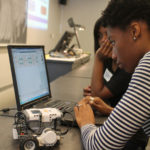Is Professional Learning for School Leaders a Priority? Accelerating Leadership Growth for School Leaders for Digital-Age Teaching & Learning
February 4, 2016
 As our team at the Friday Institute worked with schools and districts across North Carolina to develop the North Carolina Digital Learning Plan, we constantly heard from school leaders that they want and need more support and professional learning to ensure that they have the knowledge, skills, and understanding to prepare their schools, teachers, and students for digital-age teaching and learning. Like leaders in other industries, school leaders are responsible for sizable organizations with a complex mix of stakeholders; but education leaders also face limitations on options for revenue and funding sources, need to address local, state and national policies, and are required to serve all students. Education leaders rarely have opportunities or time to invest in their own learning, and at this time, minimal resources are provided to support these efforts.
As our team at the Friday Institute worked with schools and districts across North Carolina to develop the North Carolina Digital Learning Plan, we constantly heard from school leaders that they want and need more support and professional learning to ensure that they have the knowledge, skills, and understanding to prepare their schools, teachers, and students for digital-age teaching and learning. Like leaders in other industries, school leaders are responsible for sizable organizations with a complex mix of stakeholders; but education leaders also face limitations on options for revenue and funding sources, need to address local, state and national policies, and are required to serve all students. Education leaders rarely have opportunities or time to invest in their own learning, and at this time, minimal resources are provided to support these efforts.
At a time when so many challenges and opportunities exist in education, why don’t school leaders receive the same support to grow that other business executives or leaders in other industries receive?
North Carolina is on the leading edge of programs designed to help the state grow in leadership overall and digital-age teaching and learning specifically. For the past two years, in partnership with the North Carolina Principals and Assistant Principals Association (NCPAPA), with funding from the North Carolina Department of Public Instruction through Race-to-the-Top, we have offered programs for principals.
Distinguished Leadership in Practice for Digital Learning (DLP-DL)
This blended approach includes five face-to-face sessions over the course of 12 months and participation in online activities and collaboration between sessions. Topics include:
- Understanding Digital Learning
- Creating a Culture for Digital Learning (including learning spaces and workforce development)
- Shifting Teaching and Learning
- Supporting Teachers Through Professional Learning
- Implementing and Sustaining Digital Learning
This program provides job-embedded, actionable professional learning and also facilitates building a cohesive community of principal participants. As a part of the program, principals develop their personal road maps based upon their own and their school’s readiness, needs, and context. The principals become part of an alumni network as they complete the program.
Ninety-six percent of participants indicate that the program was relevant, engaging, and provided useful tools. One principal participant shared the following:
All of the educators discussed the need for a culture that supports risk taking; mentioned the need for comprehensive, yet flexible, professional development in digital integration; and the need for more device access among students. So, we are really all fighting the same battles and can assist one another through collaborative efforts.
Because North Carolina is a leader in such a program for principals, the Friday Institute, again working with NCPAPA, received funding from the national group The Learning Accelerator to build a more scalable, train-the-trainer model of this program: Leadership in Digital and Blended Learning program. This program is currently being implemented in 13 sites across the country ̶ including networks across Rhode Island and Ohio and two large districts in North Carolina.
While the programs have led to some phenomenal reflections and results already, we know that we are only beginning to reach the leaders across our state. Currently, only 100 of the 2,500 principals have had the opportunity to experience this blended learning program and participate in many activities and models they can take back to their districts and schools immediately.
From a policy perspective, the question to consider is how to provide these opportunities for all principals. With programs like DLP-DL developed and demonstrating results, how can we provide policies and resources that lead to more support to ensure that those leading teachers, students, parents, and communities have the professional learning opportunities they need?
(Dr. Wolf was a panelist and resource expert on supporting school leaders at The Hunt Institute’s December 2016 Holshouser Legislators Retreat: Education for a Stronger North Carolina | Policy, Implementation, and Results. She has developed and co-facilitated the Digital Learning Transition MOOC for Educators through the Friday Institute at NC State University and the Alliance for Excellent Education.)


